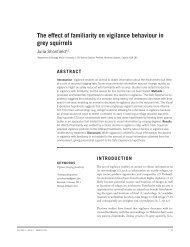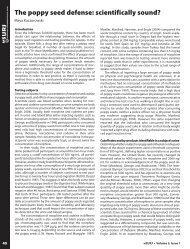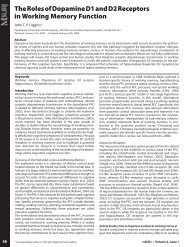the entire issue - McGill Science Undergraduate Research Journal ...
the entire issue - McGill Science Undergraduate Research Journal ...
the entire issue - McGill Science Undergraduate Research Journal ...
Create successful ePaper yourself
Turn your PDF publications into a flip-book with our unique Google optimized e-Paper software.
Proof-carrying authorization in distributed systems with Beluga: a case study<br />
FV(x) = {x}<br />
FV(λx.M) = FV(M) \ {x}<br />
FV( M N) = FV(M) ∪ FV(N)<br />
where FV(M) denotes <strong>the</strong> free variables of <strong>the</strong> lambda term M.<br />
Substitution<br />
In lambda calculus, substitution is used to mimic function application.<br />
Consider <strong>the</strong> two lambda terms λx.M and N, and application is<br />
represented on paper as M N. During this application, every free occurrence<br />
of <strong>the</strong> variable called “x” (<strong>the</strong> variable that is bound to M)<br />
which occurs in <strong>the</strong> body of M, is being substituted by <strong>the</strong> lambda<br />
term N. We write [N/x]M to represent this substitution.<br />
Capture-avoiding substitution<br />
When performing substitutions as described above, certain precautions<br />
must be taken. In order to properly perform <strong>the</strong> application M N,<br />
only free variables should be substituted (bound variables should not<br />
be touched). However, in cases when variable names are not distinct,<br />
performing substitution may result in <strong>the</strong> binding of a variable which<br />
was previously free. An example of this phenomenon, called name<br />
capture, is described below. One way to avoid name capture during<br />
substitution is to rename <strong>the</strong> free variables (<strong>the</strong> variables affected by<br />
substitution) in <strong>the</strong> relevant terms uniquely. This safe substitution is<br />
known as capture-avoiding substitution.<br />
To see <strong>the</strong> importance of renaming, consider <strong>the</strong> following example:<br />
In <strong>the</strong> expression λx.xz, z is <strong>the</strong> only free variable. However, to perform<br />
<strong>the</strong> substitution [x/z] λx.xz, <strong>the</strong> result, before renaming would<br />
be λx.xx. In this way, z has been “captured”, its distinction from <strong>the</strong><br />
variable x has been lost.<br />
The correct way to perform this substitution is to first rename <strong>the</strong><br />
free variables. Through alpha-equivalence, λx.xz == λy.yz. Now, [x/z]<br />
λy.yz= λy.yx, which is <strong>the</strong> intended result (7).<br />
Functional Programming<br />
Functional programming is a programming paradigm based on <strong>the</strong><br />
ideas of lambda calculus. Functional programs use function evaluation<br />
as <strong>the</strong> basis for computation. The better known imperative programming<br />
languages, such as Java or C, rely on mutating data and<br />
changing <strong>the</strong> state of <strong>the</strong> machine ra<strong>the</strong>r than function evaluation.<br />
One consequence of functional programming’s reliance on function<br />
evaluation is its extensive use of recursion. The more familiar imperative<br />
programs rely more heavily on iteration. Writing code in a<br />
recursive fashion generally takes less space than iterative code, allowing<br />
functional programs to have code which is cleaner and easier<br />
to read.<br />
Functional programs also avoid side effects. That is, observable<br />
changes such as writing data to disk or changing variable names are<br />
bypassed during computation. Conversely, imperative programs do<br />
use side effects (also referred to as referential opaqueness), so <strong>the</strong><br />
output of imperative code can change depending on <strong>the</strong> current state<br />
of <strong>the</strong> system. Functional programs, which avoid this dependence on<br />
<strong>the</strong> current state of <strong>the</strong> machine to determine <strong>the</strong> output, do not output<br />
results dependent on <strong>the</strong> state of <strong>the</strong> machine and are <strong>the</strong>refore<br />
more predictable and thus easier to reason about.<br />
Lastly, functional programming has <strong>the</strong> property that each expression<br />
has a single value (referential transparency) (10). The use of<br />
referential transparency ensures that each expression has a unique<br />
value, eliminating confusion and giving <strong>the</strong> programmer a greater<br />
sense of control.<br />
Recall that substitution of lambda terms must be capture-avoiding.<br />
Issues such as name capture also arise when performing function<br />
application in functional programs. Functional programs <strong>the</strong>n must<br />
be able to generate fresh variable names, rename variables and perform<br />
capture-avoiding substitution appropriately. Although <strong>the</strong>se<br />
procedures are extremely common in functional programming, most<br />
functional programming languages require <strong>the</strong>se procedures to be<br />
manually implemented.<br />
Beluga<br />
Beluga is a newly developed pure functional programming language<br />
which provides a novel programming and proof environment. The<br />
motivation behind <strong>the</strong> development of Beluga was <strong>the</strong> desire to provide<br />
an environment in which to set up formal systems and proofs<br />
and in which <strong>the</strong> aforementioned lack of support for <strong>the</strong> common<br />
operations in functional programming languages (capture-avoiding<br />
substitution, renaming, fresh name generation) is remedied.(4).<br />
While Beluga successfully achieves automatic support for <strong>the</strong>se operations,<br />
it does not include support for input and output operations,<br />
references or exceptions.<br />
Types are <strong>the</strong> foundational tools used to build programs. Built-in<br />
types common to many programming languages include integer,<br />
character or double. Beluga does not have any predefined data types<br />
but it does support dependent types, or types which depend on o<strong>the</strong>r<br />
variables.<br />
Because Beluga does not have a predefined type system, a Beluga programmer<br />
must declare his own types. For example, <strong>the</strong> integer type<br />
56<br />
<strong>McGill</strong> <strong>Science</strong> <strong>Undergraduate</strong> <strong>Research</strong> <strong>Journal</strong> - msurj.mcgill.ca









